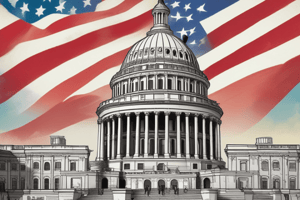Podcast
Questions and Answers
What is the definition of democracy?
What is the definition of democracy?
A system of government where power is held by the people, either directly or through elected representatives
What are the key principles of democracy?
What are the key principles of democracy?
Sovereignty of the people, equality of citizens, protection of individual rights and freedoms, free and fair elections, and accountability of leaders to the people
What is direct democracy?
What is direct democracy?
A system where citizens make decisions directly, often through referendums and ballots
What is the difference between representative democracy and participatory democracy?
What is the difference between representative democracy and participatory democracy?
What is the main characteristic of liberal democracy?
What is the main characteristic of liberal democracy?
What is the purpose of separation of powers in a democratic system?
What is the purpose of separation of powers in a democratic system?
What is the impact of voter apathy on democracy?
What is the impact of voter apathy on democracy?
What is manipulation and corruption in a democratic system?
What is manipulation and corruption in a democratic system?
How does globalization affect democratic processes?
How does globalization affect democratic processes?
What is the role of an independent judiciary in a democratic system?
What is the role of an independent judiciary in a democratic system?
Flashcards are hidden until you start studying
Study Notes
Definition and Principles
- Democracy: a system of government where power is held by the people, either directly or through elected representatives
- Key principles:
- Sovereignty of the people
- Equality of citizens
- Protection of individual rights and freedoms
- Free and fair elections
- Accountability of leaders to the people
Types of Democracy
- Direct Democracy: citizens make decisions directly, often through referendums and ballots
- Representative Democracy: citizens elect representatives to make decisions on their behalf
- Participatory Democracy: a mix of direct and representative democracy, with citizens actively participating in decision-making processes
- Liberal Democracy: a representative democracy that emphasizes individual rights and freedoms, and limits government power
Characteristics
- Separation of Powers: division of government into legislative, executive, and judicial branches to prevent abuse of power
- Checks and Balances: system of limits and controls to prevent one branch of government from dominating the others
- Freedom of Speech and Assembly: protection of citizens' rights to express opinions and gather peacefully
- Independent Judiciary: an impartial and independent judicial system to uphold the rule of law
Challenges and Limitations
- Voter Apathy: low voter turnout and disengagement from the political process
- Inequality and Discrimination: unequal access to political power and representation for marginalized groups
- Manipulation and Corruption: influence of money and special interests on the political process
- Globalization and International Pressures: impact of global events and external influences on domestic democratic processes
Definition and Principles of Democracy
- Democracy is a system of government where power is held by the people, either directly or through elected representatives.
- Sovereignty of the people is a key principle, meaning that the people have the ultimate authority.
- Equality of citizens is another principle, ensuring that all citizens have equal rights and opportunities.
- Protection of individual rights and freedoms is a fundamental principle, guaranteeing citizens' autonomy and liberty.
- Free and fair elections are essential, allowing citizens to choose their representatives and hold them accountable.
- Accountability of leaders to the people is crucial, ensuring that leaders are responsible to the citizens who elected them.
Types of Democracy
- Direct Democracy involves citizens making decisions directly, often through referendums and ballots.
- In Representative Democracy, citizens elect representatives to make decisions on their behalf.
- Participatory Democracy combines elements of direct and representative democracy, with citizens actively participating in decision-making processes.
- Liberal Democracy is a representative democracy that emphasizes individual rights and freedoms, and limits government power.
Characteristics of Democracy
- Separation of Powers is a key characteristic, dividing government into legislative, executive, and judicial branches to prevent abuse of power.
- Checks and Balances are used to limit and control each branch of government, preventing any one branch from dominating the others.
- Freedom of Speech and Assembly is protected, allowing citizens to express opinions and gather peacefully.
- An Independent Judiciary is essential, upholding the rule of law and ensuring an impartial and independent judicial system.
Challenges and Limitations of Democracy
- Voter Apathy is a challenge, characterized by low voter turnout and disengagement from the political process.
- Inequality and Discrimination can limit democracy, resulting in unequal access to political power and representation for marginalized groups.
- Manipulation and Corruption can undermine democracy, with the influence of money and special interests on the political process.
- Globalization and International Pressures can impact domestic democratic processes, with global events and external influences affecting democracy.
Studying That Suits You
Use AI to generate personalized quizzes and flashcards to suit your learning preferences.




